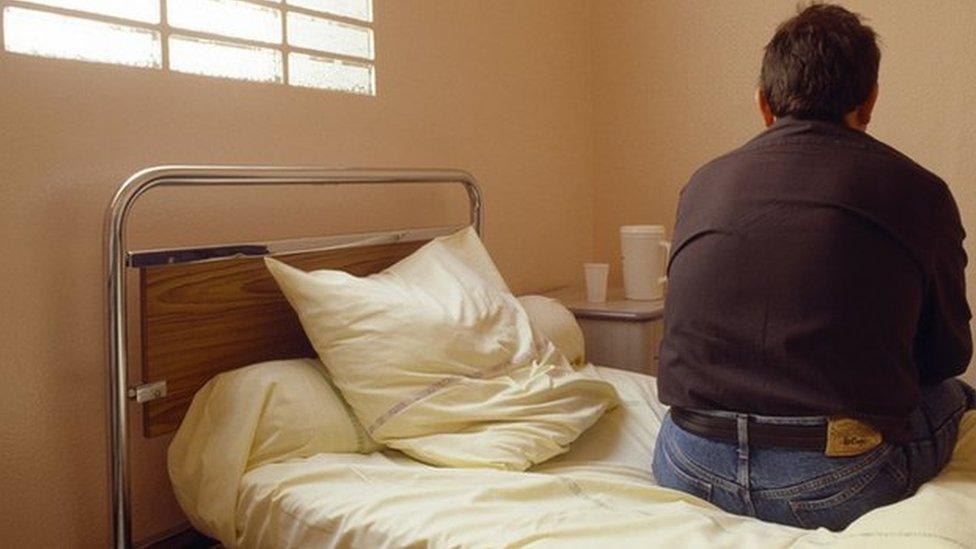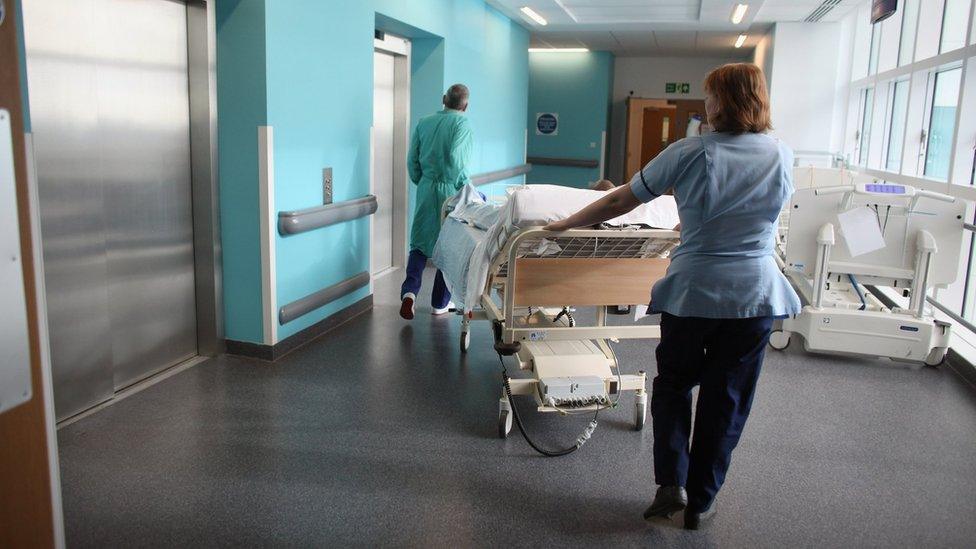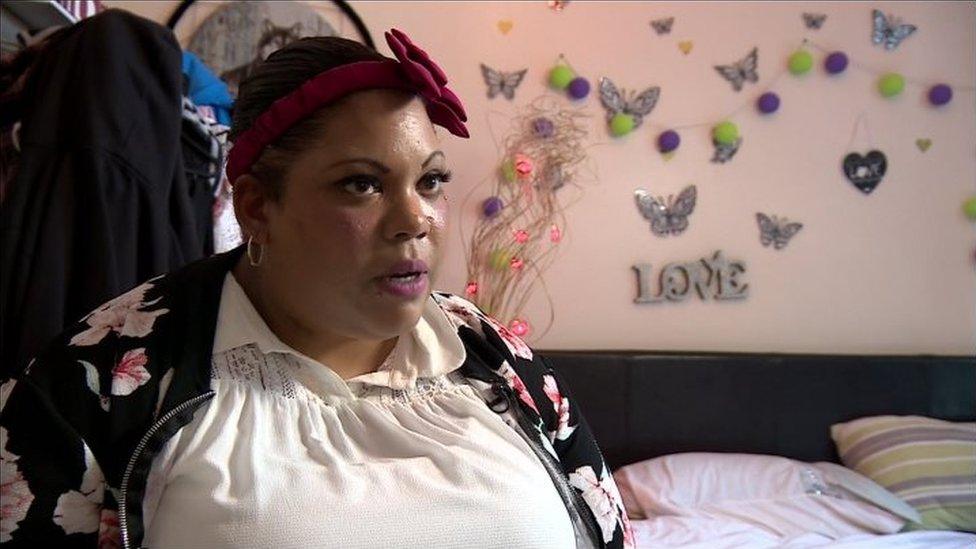Scots mental health patients 'wait years for discharge'
- Published
One health board had more than a quarter of available mental health inpatient beds taken up by delayed discharge patients
Mental health patients in Scotland have spent years stranded in acute units awaiting discharge, figures reveal.
The BBC has conducted a UK-wide investigation of delayed discharges among mental health inpatients.
Three Scottish health boards had patients wait more than three years to be moved out of such a unit after they were declared ready to leave.
One board had more than a quarter of available mental health inpatient beds taken up by delayed discharge patients.
Health officials said the reasons for such delays were often complex, adding that resolving the issues was a top priority.
At least 19 patients have waited more than a year to be discharged from health units in Scotland over the past two years. A further 32 had to wait more than 100 days.
Longest delays
NHS Lothian saw the longest wait, recorded at 1,200 days, while NHS Tayside listed one delay of 1,196 days and NHS Greater Glasgow and Clyde one of 1,193.
The Tayside and Glasgow patients had complex needs and were awaiting transfer to specialist facilities, while no information was provided about the reasons for the delay in Lothian.
At each of these three boards, all of the five patients suffering the longest delays had to wait over a year.
In February, when the freedom of information requests were processed, NHS Tayside had 29.4% of acute mental health care beds taken up by patients who had been declared ready for discharge.
The board said this figure fluctuates, and was down to 16% on 1 August.

Across the UK as a whole, at least 325 patients had to wait at least 100 days to be discharged over the past two years.
At least 95 patients saw their discharge delayed for more than a year, while at least eight had to wait more than two years.
The longest delay in England was of 1,159 days, for a 62-year-old patient at Sussex Partnership NHS Foundation Trust. In Wales, Hywel Dda health board saw a delay of 975 days, while in Northern Ireland a 76-year-old patient was delayed for 1,235 days at the Southern Health and Social Care trust.
However, due to differences in how the data is recorded, direct comparisons between delays in each nation are not possible.

What is the situation in Scotland?
NHS Orkney and NHS Shetland do not have any acute mental health patients, while NHS Grampian did not provide figures.

What do the experts say?

Colin McKay, chief executive of the Mental Welfare Commission for Scotland, said the delays were a "human rights issue".
He said: "These are people who are in hospital when they don't need to be and sometimes don't want to be. They may have been detained in the hospital under the mental health act and are being required to stay there for substantially longer periods than they need to be for their clinical needs. That just isn't acceptable, and it needs to be addressed."
Dr John Crichton, chairman of the Royal College of Psychiatrists in Scotland, said improvements had been made in recent years, particularly for frail, elderly patients who are the most likely group to face delayed discharge from hospital.
He said the figures revealed by the BBC investigation were "exceptional cases" but added that there is "no room for complacency, and particular attention should be focused on those who are delayed more than a few months".
He said: "There will always be challenges in providing services for people with very specific needs, but there are examples of good practice in Scotland, such as providing bespoke packages of care for those with intellectual disabilities."
'Reduced budgets'
Billy Watson, chief executive of the Scottish Association for Mental Health (SAMH), said it was "clear" that reduced budgets for social care was behind the lengthy delays.
He said: "Keeping people with mental health problems in hospital longer than is necessary isn't good for their mental health or their long-term recovery. We want to see people being treated on an individual basis and settling back into their community as soon as they are ready to do so.
"If services aren't available in the community, then people can't be safely discharged from hospital. We need to start investing in our community mental health services."
And Nigel Henderson, chief executive of Penumbra, a third sector organisation that runs a step-down house in Edinburgh to ease the pressure on hospital acute beds, said there was wrangling over budgets in spite of the move towards health boards and councils working in partnership.
He said: "One of the biggest challenges is that with health and social care partnerships, their funding comes from the local authority and from the NHS. While the idea was to create a 'health and social care pound', we're actually still seeing it identified as a 'local authority pound' and an 'NHS pound'.
"In terms of that integrated thing, we still need to see budgets that are actually in the ownership, if you like, of the health and social care partnership and people aren't saying 'that's our money and we need to see if go this way'."

What do patients say?
.jpg)
Toni Adeniyi, 32, has spent 15 years as a mental health inpatient, suffering from unstable emotional personality disorder, and schizoaffective disorder.
"At times I wasn't well, I used to attack people, I wasn't talking my medication properly. I just wasn't allowed off the unit," she said.
However, when Toni was ready to be released, she was stuck on an acute ward for another six months.
"I think it was due to funding, and paperwork. It was a bit frustrating," she said.
"I used to see other people leaving before me, and I would think, 'I've been ready a long time, and I'm more equipped', but they seemed to get out quicker."
Eventually, she was placed in mental health charity Together's supported step-down unit in Wellingborough, which helped her adjust to life outside hospital. She explained that the transition to the unit, and the freedom to do little things she couldn't do while on a ward, made all the difference.
She said: "It's doing my own cooking, doing things I want to do. I can have things in my room like mirrors, razors, glass and aerosols, because you are not allowed that in hospital."

What do the health boards say?

Prof Alex McMahon, director of nursing at NHS Lothian, apologised to "all patients who have experienced a delay in being discharged from care".
He said: "Some patients have complex needs and it's vital we have a full plan in place before they leave our care, so that their specific needs can be met properly, at home or in another setting. We continue to work closely with our four health and social care partners to improve our performance in this area."
Bill Troup, head of mental health services for Tayside, said delayed discharges in mental health units were a "top priority".
He said: "The reasons for delayed discharges within adult mental health services can be very unique and complex. For example, it may be necessary to work in partnership with third sector social care providers to specially commission a new building to accommodate a patient and any live-in carers.
"Legal implications linked to complex guardianship applications can also contribute to delays."
A spokesman for NHS Greater Glasgow and Clyde said "significant improvements" had been made on delayed discharges in recent years.
He said: "It is our aim that people are discharged from a clinical setting as soon as they are ready. However, if they are delayed, our staff strive to provide the highest standards of care while they remain in our care.
"A number of patients whose discharge is delayed will have complex care needs and may be waiting for suitable care arrangements to be commissioned in community settings."
- Published3 August 2017

- Published3 August 2017

- Published6 June 2017

- Published30 March 2017

- Published15 February 2016
